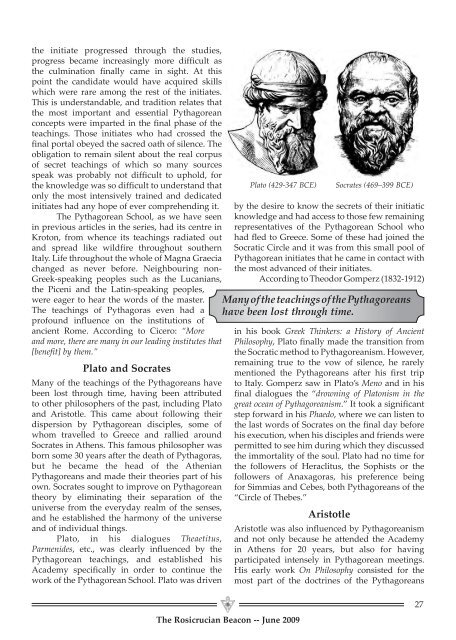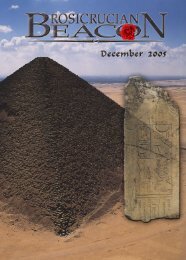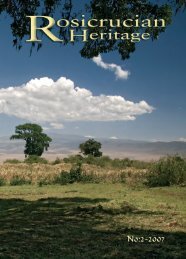RosicRucian - AMORC
RosicRucian - AMORC
RosicRucian - AMORC
- No tags were found...
You also want an ePaper? Increase the reach of your titles
YUMPU automatically turns print PDFs into web optimized ePapers that Google loves.
the initiate progressed through the studies,progress became increasingly more difficult asthe culmination finally came in sight. At thispoint the candidate would have acquired skillswhich were rare among the rest of the initiates.This is understandable, and tradition relates thatthe most important and essential Pythagoreanconcepts were imparted in the final phase of theteachings. Those initiates who had crossed thefinal portal obeyed the sacred oath of silence. Theobligation to remain silent about the real corpusof secret teachings of which so many sourcesspeak was probably not difficult to uphold, forthe knowledge was so difficult to understand thatonly the most intensively trained and dedicatedinitiates had any hope of ever comprehending it.The Pythagorean School, as we have seenin previous articles in the series, had its centre inKroton, from whence its teachings radiated outand spread like wildfire throughout southernItaly. Life throughout the whole of Magna Graeciachanged as never before. Neighbouring non-Greek-speaking peoples such as the Lucanians,the Piceni and the Latin-speaking peoples,were eager to hear the words of the master.The teachings of Pythagoras even had aprofound influence on the institutions ofancient Rome. According to Cicero: “Moreand more, there are many in our leading institutes that[benefit] by them.”Plato and SocratesMany of the teachings of the Pythagoreans havebeen lost through time, having been attributedto other philosophers of the past, including Platoand Aristotle. This came about following theirdispersion by Pythagorean disciples, some ofwhom travelled to Greece and rallied aroundSocrates in Athens. This famous philosopher wasborn some 30 years after the death of Pythagoras,but he became the head of the AthenianPythagoreans and made their theories part of hisown. Socrates sought to improve on Pythagoreantheory by eliminating their separation of theuniverse from the everyday realm of the senses,and he established the harmony of the universeand of individual things.Plato, in his dialogues Theaetitus,Parmenides, etc., was clearly influenced by thePythagorean teachings, and established hisAcademy specifically in order to continue thework of the Pythagorean School. Plato was drivenPlato (429-347 BCE)Socrates (469–399 BCE)by the desire to know the secrets of their initiaticknowledge and had access to those few remainingrepresentatives of the Pythagorean School whohad fled to Greece. Some of these had joined theSocratic Circle and it was from this small pool ofPythagorean initiates that he came in contact withthe most advanced of their initiates.According to Theodor Gomperz (1832-1912)Many of the teachings of the Pythagoreanshave been lost through time.in his book Greek Thinkers: a History of AncientPhilosophy, Plato finally made the transition fromthe Socratic method to Pythagoreanism. However,remaining true to the vow of silence, he rarelymentioned the Pythagoreans after his first tripto Italy. Gomperz saw in Plato’s Meno and in hisfinal dialogues the “drowning of Platonism in thegreat ocean of Pythagoreanism.” It took a significantstep forward in his Phaedo, where we can listen tothe last words of Socrates on the final day beforehis execution, when his disciples and friends werepermitted to see him during which they discussedthe immortality of the soul. Plato had no time forthe followers of Heraclitus, the Sophists or thefollowers of Anaxagoras, his preference beingfor Simmias and Cebes, both Pythagoreans of the“Circle of Thebes.”AristotleAristotle was also influenced by Pythagoreanismand not only because he attended the Academyin Athens for 20 years, but also for havingparticipated intensely in Pythagorean meetings.His early work On Philosophy consisted for themost part of the doctrines of the PythagoreansThe Rosicrucian Beacon -- June 200927











